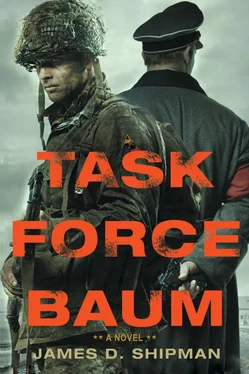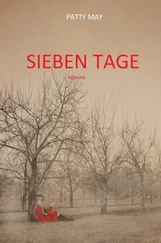The captain stared into Waters’s hard blue eyes.
“You will survive. That’s an order.”
Waters was a brave officer, and his resolve inspired the captain. “I will, sir. I’ll find a way.”
The colonel saluted him, his eyes maintaining a bridge for another moment before he hurried off. Curtis breathed deeply in and out, trying to force back the crippling sting in his back. He couldn’t stand straight. His left shoulder was crooked, down a few inches lower than his right. Still, by concentrating and fighting back the pain, he was able to maintain his position.
Guards were walking up and down the rows now, counting out the men and checking the numbers against a clipboard. Curtis knew with mounting apprehension that the numbers in his group would not match up. There would be one too many, and then the Germans would scrutinize the men more carefully to figure out why. He turned his head to the left, scanning the long lines toward his barracks. He knew he would never make it there.
By some miracle, the krauts completed the count without any commotion. Perhaps the guards were just going through the motions. As the Germans, in line after line, completed their task, they seemed to lose interest in the POWs and grouped up, standing nearby, laughing and joking, enjoying cups of coffee while the kriegies continued to stand there, shivering in the freezing morning air.
Minutes turned to an hour. The Americans stood at attention, moment by agonizing moment, shaking in their inadequate clothing, waiting for the Germans to take them farther into captivity. For Curtis, the interval was unbearable. The pain mounted with each passing second, as fire burned up his back and down his legs. He was sure he would fall, crumpling in the dirt. He kept Waters’s last words close. They were a cross he clung to in his agony.
Curtis saw a movement to his right. He glanced with his eyes and made out the Kommandant , General von Goeckel, stepping to the front accompanied by a few other officers and trailed by Sergeant Knorr. The general walked along the line of men, looking up and down the rows and chatting with his officers. Curtis could not make out what they were saying. Finally, he turned to address the POWs.
“ Guten tag! I trust you’ve had a good morning,” the general shouted in his thick accent. “I apologize for the wait, but our trains are running behind schedule. I’ve just been informed that they will be here within the hour. I will need you to be patient for just a little longer, and then we will walk to the station. The march will be several of your miles. If you believe you are unable to walk that far, please inform one of the guards, and alternative arrangements will be made for you. I will not be accompanying you to your new camp. I encourage you, as I have here, to follow orders, respect your guards, and we will all get through this together. As soon as the German victory is complete, you will be sent home. Until then, good luck and auf wiedersehen! ”
The men murmured but did not protest. The guards would react violently and swiftly to any overt reaction. Curtis stood in shock. What was he going to do? He would never make it two miles to a train station. He was desperate. Perhaps he could group himself in the middle of many men, and a few of them could help him walk. He would have to talk to Waters.
“Herr Captain, I’m surprised to see you in line.” Curtis recognized Knorr’s silky voice immediately. The fear closed in around him. He turned to see the sergeant standing a few feet from him, an ironic grin laced across his face again.
“I’m fine,” Curtis muttered.
“Oh, I’m sure you are, but I must make sure you are a suitable candidate for so arduous a journey as the train station. I’m sure you understand.”
“I can make it,” Curtis said through gritted teeth.
“Well, let’s make sure, shall we? Come here, Captain.”
Curtis, turned, limping through the men, holding himself as upright as possible, trying desperately to keep his face expressionless as he battled internally to push down the pain. He made it out of the line and over to the sergeant. “See, I’m able to walk.”
“ Ach , so. But this is just a little distance. I would worry if you had trouble on the longer march. Let’s do some calisthenics to make sure you are fit.” The sergeant tapped his cheek with his finger, as if giving the matter considerable thought. “I know, some deep knee bends should get us started. I’d like twenty. Now, Captain!”
Curtis knew there was nothing he could do to resist. He had to try. He kept Waters’s words close in his mind. I can do this . He put his arms out, stared hard at the sergeant, and dipped his body down, bending his knees. The agony was crippling. He felt dizzy and thought he might fall over. Somehow, he pushed through the fire and pulled himself erect again. Struggling, he bent again, repeating the excruciating cycle.
The sergeant called out each with glee. “ Eins, zwei, drei… ”
Curtis continued, but twenty seemed impossible.
“No, no, Captain. That won’t do,” said Knorr, shaking his head in mock disapproval. “I need you to do a proper knee bend. All the way down. Let me show you.” He stepped forward, placed both of his hands on the captain’s shoulders, and shoved him down hard. Curtis tried to recover, pushing upward at the last minute, but he was too weak and there was too much pain. He felt the rippling agony tearing through his back; he tried to rise, but it was all too much. He toppled over, screaming in misery.
“Oh, no, mein Captain,” said Knorr, leaning over him and shaking his head. “This simply won’t do. I’m afraid you are not fit for this journey. How sad. I was cheering for you this whole time. I wish there was an alternative, but I’m afraid I have no choice.” Knorr smiled, winking. He reached his right hand over and drew out his pistol, lowering it until it rested against Curtis’s temple. “As the general said, auf wiedersehen , Captain.”
Curtis closed his eyes, waiting for the darkness to come.
Near Neuendorf, Germany
March 27, 1945, 0900 hours
“Hall, get up!” He heard the order and knew it was Stiller. He tried to rise, but his stomach still burned, and he hunched over again, retching on the grass. He could hear the screams and the pleading of the wounded girls just a few feet away from him.
“Damn it, Lieutenant! We don’t have time for this bullshit! Now get your ass up and moving. We’ve got to go!”
“We have to help them,” he muttered, wiping his mouth and spitting the remaining bile out.
“No time for that. We have to leave now.”
“But they’re dying. They’re women.”
“This is war, Hall. It’s messy, bloody, awful shit. Now get your ass up, and let’s get out of here!”
He felt the major’s hands on the back of his shirt. Stiller jerked him, and the lieutenant allowed himself to be pulled to his feet. He turned around to face his commander’s fierce features, etched in creases of stern countenance.
“Hall, I know that’s some tough stuff down there. But you got to remember, nobody knew it was full of women. Besides, the damned Nazis use females in their army.” He pointed to the truck. “Look at their uniforms. Those are soldiers. Now I’d love to stop here and help them. Every part of what makes me a man wants to do that. But we can’t, Hall. We’re on a mission. We don’t have the troops, and we don’t have time to stall here. We’ve got to get moving. We’re already late.”
“What’s the holdup?” asked Captain Baum. The task force leader had stepped down the incline and was standing with fists tucked against his sides, clearly impatient with the delay.
Читать дальше












